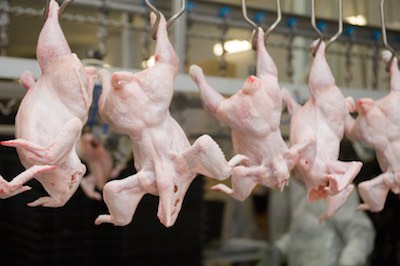The recall of chicken for dioxin contamination that was imported from Chile has expanded according to the USDA’s Food Safety and Inspection Service (FSIS). The government of Chile notified U.S. officials that the chicken tested positive for the carcinogenic substance. As of today, 343,637 pounds of chicken may be affected and 155,595 pounds is currently being held. FSIS determined that 188,042 pounds of the chicken was distributed to federal establishments for further processing, a distributor, and retail locations in Florida, Georgia, New York, Pennsylvania, and Puerto Rico.
 Public health officials in the U.S. conducted an analysis of the Chilean test results and have determined that the risk to consumers is negligible. But they are considered unfit for consumption and adulterated, and should be destroyed. The chicken was produced at San Vicente Establishment (Chilean Est. 0608) on May 30, 2013 and June 12, 2013.
Public health officials in the U.S. conducted an analysis of the Chilean test results and have determined that the risk to consumers is negligible. But they are considered unfit for consumption and adulterated, and should be destroyed. The chicken was produced at San Vicente Establishment (Chilean Est. 0608) on May 30, 2013 and June 12, 2013.
The U.S. government has not recalled the chicken; the recall is from the government of Chile. FSIS is not announcing a recall because “the establishment most directly associated with producing the adulterated product has recalled product, and USDA works with its counterparts to conduct effectiveness checks in the United States.”
Dixoins come from forest fires, industrial emissions, and burning trash. The chemical gets into plants, and are eaten by animals, where they become concentrated in the body fat. At “very high doses for a prolonged period”, according to the USDA release, dioxins can have adverse health effects.
According to the World Health Organization (WHO), “dioxins are highly toxic and can cause reproductive and developmental problems, damage the immune system, interfere with hormones and also cause cancer.” The WHO also states that “due to the highly toxic potential of this class of compounds, efforts need to be undertaken to reduce current background exposure.” And once dioxins get into your body, they stay for a long time because they are quite stable. Their half-life is seven to eleven years. The higher you go in the food chain, the higher the concentration of dioxins. And chronic exposure to dioxin leads to cancer.




